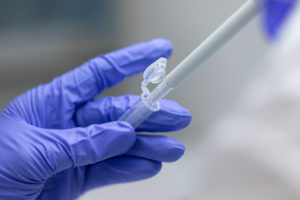WE BELIEVE IN THE POWER OF
COLLECTIVE EFFORTS
FOR SUSTAINABLE CHANGE
L’OCCITANE en Provence and CARBIOS present
PET bottle made from enzymatic recycling
A transparent PET shower oil bottle made entirely from enzymatic recycling!
This bottle from the Amande range of L’OCCITANE en Provence was developed in collaboration with Pinard Beauty Pack. It symbolizes our common desire to build an efficient European sector, thus accelerating the transition to a circular economy for plastics and respecting the brands’ commitments for more environmentally friendly packaging solutions.
A sustainable European recycling sector set in motion
The bottle’s production began with the local supply of PET waste (already collected, sorted and prepared) to the CARBIOS demonstration plant in Clermont-Ferrand, France. The waste used consisted of colored bottles, multilayer trays and mechanical recycling residues, none of which are currently recycled using conventional technologies. CARBIOS deconstructed the PET waste into its original monomers, PTA and MEG, using its biorecycling technology. The resulting monomers were then repolymerized into new, fully recycled PET resins within Europe. In Oyonnax, France, these resins were blow-molded by Pinard Beauty Pack to create bottles according to L’OCCITANE’s specifications, and then filled with its shower oil at its Manosque plant.
This European approach optimizes the environmental benefits of the technology and the life cycle analysis (LCA) of each product, by reducing transport distances and integrating local collection and production processes

CONSORTIUMS
Packaging
In 2017, Carbios and L’Oréal co-founded a consortium to industrialize the recycling technology designed and developed by Carbios. Committed to developing innovative solutions for sustainable development, Nestlé Waters, PepsiCo and Suntory Beverage & Food Europe joined this consortium in April 2019 to promote the circular economy of plastics thanks to Carbios’ disruptive technology. The Consortium’s partners aim to industrialize Carbios’ technology and thus increase the availability of high-quality recycled plastics. As part of this collaboration, technical steps and support are planned to ensure a good supply of 100% recycled PET plastics worldwide.

Textile
In 2022, Carbios has signed an agreement with On, Patagonia, PUMA, and Salomon, to develop solutions that will enhance the recyclability and circularity of their products. An important element of the two-year deal will be to speed up the introduction of Carbios’ unique biorecycling technology, which constitutes a breakthrough for the textile industry. Carbios and the four companies will also research how products can be recycled, develop solutions to take-back worn polyester items, including sorting and dismantling technologies, and gather data on fiber-to-fiber recycling as well as circularity models.

Industrial Partners
In 2020, Carbios signed an exclusive co-development agreement with Novonesis (ex. Novozymes), the world leader in enzyme production. This collaboration guarantees the production of the![]() proprietary enzyme for PET degradation during the demonstration and industrial deployment phases. In 2023, Carbios and Novozymes strengthen collaboration with long-term exclusive strategic partnership to secure worldwide leadership in biorecycling of PET. The strategic partnership supports the large-scale industrial deployment of Carbios’ patented PET-recycling technology starting with Carbios’ future industrial reference unit in Longlaville (France), which will be the world’s first biological PET-recycling plant. Construction will begin later this year, and both building and operating permits having been filed with local authorities. Production at the plant is set to start in 2025 and the processing capacity will be 50,000 tonnes of waste per year.
proprietary enzyme for PET degradation during the demonstration and industrial deployment phases. In 2023, Carbios and Novozymes strengthen collaboration with long-term exclusive strategic partnership to secure worldwide leadership in biorecycling of PET. The strategic partnership supports the large-scale industrial deployment of Carbios’ patented PET-recycling technology starting with Carbios’ future industrial reference unit in Longlaville (France), which will be the world’s first biological PET-recycling plant. Construction will begin later this year, and both building and operating permits having been filed with local authorities. Production at the plant is set to start in 2025 and the processing capacity will be 50,000 tonnes of waste per year.
 Since February 2017, Carbios and Technip Energies (formerly TechnipFMC), world leader in engineering in the areas of energy, chemistry and bio-sourced industries, have collaborated on the industrial development of Carbios’ PET enzymatic recycling process. Carbios is also supported and advised by Technip Energies for the engineering and construction oversight of its demonstration plant as well as for the design phase of the first commercial biorecycling plant, scheduled for commissioning at the end of 2025.
Since February 2017, Carbios and Technip Energies (formerly TechnipFMC), world leader in engineering in the areas of energy, chemistry and bio-sourced industries, have collaborated on the industrial development of Carbios’ PET enzymatic recycling process. Carbios is also supported and advised by Technip Energies for the engineering and construction oversight of its demonstration plant as well as for the design phase of the first commercial biorecycling plant, scheduled for commissioning at the end of 2025.

Management of the plant construction project and detailed engineering are entrusted to De Smet Engineers & Contractors (DSEC), a world-class provider of Engineering, Procurement and Construction services in the biotech’s and agro-processing industries. With over 70 members of De Smet’s expert team dedicated to the project and working alongside CARBIOS teams, the collaboration aims to guarantee the timeline and budget for the construction of the world’s first biorecycling plant while upholding stringent quality, safety, health, and environmental standards. Construction is currently underway and on schedule.
Academic Partners
 Since its creation, Carbios has demonstrated its commitment to working closely with academics to conduct its research and development program. The Company collaborates with leading academic teams in the fields of microbiology, enzymology, molecular biology, bioinformatics, bioprocesses and polymer chemistry, and in particular with teams from the TBI laboratory, a public laboratory for research under the triple supervision of CNRS, INRAE and INSA Toulouse. The strengthening of the Company’s portfolio of innovations in development is partly the result of these collaborations and demonstrates the success of our commitment to partnership projects.
Since its creation, Carbios has demonstrated its commitment to working closely with academics to conduct its research and development program. The Company collaborates with leading academic teams in the fields of microbiology, enzymology, molecular biology, bioinformatics, bioprocesses and polymer chemistry, and in particular with teams from the TBI laboratory, a public laboratory for research under the triple supervision of CNRS, INRAE and INSA Toulouse. The strengthening of the Company’s portfolio of innovations in development is partly the result of these collaborations and demonstrates the success of our commitment to partnership projects.
In 2020, Carbios announced the set-up of a new strategic alliance with INSA Toulouse through its TBI laboratory to have access to an internationally recognized enzymatic engineering research center working on plastic recycling and biosynthesis. This laboratory, called PoPLaB (Plastic Polymers and Biotechnologies) thus gives a new dimension to its research activities by reinforcing the internalization of its work. It is the culmination of seven years of scientific collaboration that resulted in the publication in the prestigious journal Nature of the work carried out with TBI in 2020.
Research within PoPLaB focuses on enzymes as well as on the enzyme / polymer interface, thus developing fundamental and applied research activities dedicated to biocatalysis. The research is divided into several areas:
-
- Discovery of new environmental enzymes capable of depolymerizing plastics
- Characterization of enzymatic performances with respect to the application objective
- Enzymatic engineering to improve their performance (activity, thermostability, yields), with the “rational enzymatic engineering” and “random enzymatic engineering” teams.
- Performance validation during scaling up
Carbios is also a sponsor of the INSA Toulouse Foundation, which makes a significant contribution to the training and international outreach of students and scientific executives with the creation of a program backed by the “Biotechnologies and Environment” Chair.
Institutional
Carbios also benefits from the support of leading institutional partners, notably the Truffle Capital fund, Bpifrance (via the financing of the Thanaplast project) and the ADEME (financing of the CE-PET project.)

